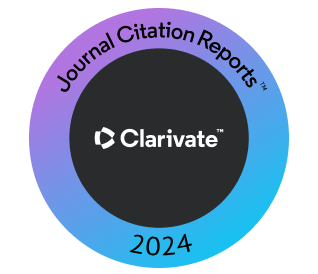Wild Cherry (Prunus microcarpa) Ameliorates Azoxymethane-Induced Aberrant Crypt Foci in vivo
Depicted Molecular Mechanisms
DOI:
https://doi.org/10.14500/aro.12399Keywords:
Aberrant crypt foci, Antioxidant, Histopathological, Immunohistochemical, Prunus microcarpaAbstract
Colorectal cancer is the third diagnosed cancer across the globe despite modern therapeutic interventions. Prunus microcarpa has been consumed as a therapeutic tea for several human disorders; therefore, the study investigates the chemoprotective effects of Prunus microcarpa against azoxymethane-induced aberrant crypt foci (ACF) in rats. Fifty Sprague-Dawley rats were divided into five groups: a normal control group and untreated rats given saline; a reference group treated with 5-fluorouracil; and two groups treated with 500 mg/kg methanolic extracts of fruits and stems (MEPMF and MEPMS), separately, for two months. Additionally, all rats, except the normal controls, were injected with azoxymethane twice a week for two consecutive weeks and consumed sodium dextran sulfate-mixed water for seven days. The plant extracts exhibited significant resistance against AOM-induced colon carcinogenesis, as indicated by lower ACF formation, reduced glandular dysplasia, decreased hyperchromasia, and a higher organization of simple columnar epithelial cells compared to vehicle rats. Immunohistochemical results demonstrated increased modulatory effects of MEPMF on apoptosis mediators, evidenced by higher Bax and lower PCNA levels in colonic tissues compared to MEPMS. Prunus supplementation led to decreased oxidative stress and cellular infiltrations in colon tissues, as evidenced by increased endogenous antioxidants (SOD, CAT, and GPx) and reduced inflammatory mediators (TNF-α and IL-6) and lower levels of peroxidation byproducts (MDA), while preserving organ functions such as those of the liver and kidneys. This study presents safety margin and chemoprotective effects of P. microcarpa against AOM-induced colon cytotoxicity, evidencing a viable source for nutraceutical and biopharmaceutical formulation.
Downloads
References
AbdulJabbar, A.A., and Ismail, P.A., 2025. Wild cherry prunus microcarpa: Phytochemical characterization by LCESI MS/MS technique and its cytotoxicity, and pro-apoptotic actions. Plant Foods for Human Nutrition, 80(1), p.67. DOI: https://doi.org/10.1007/s11130-025-01298-8
Abdulrahman, S.S., and Shahbaz, S.E., 2020. Prunus longispinosa (rosaceae): A new species from Kurdistan-Iraq. Pakistan Journal of Botany, 52(2), pp.645-651. DOI: https://doi.org/10.30848/PJB2020-2(36)
Adane, F., Assefa, W., Alem, M.B., and Dessalegn, M., 2023. Sub-chronic toxicity of the aqueous leaf extract of Ocimum lamiifolium Hochst. Ex benth on biochemical parameters and histopathology of liver and kidney in rats: In vivo and in- silico toxicity studies. BMC Complementary Medicine and Therapies, 23(1), p.30. DOI: https://doi.org/10.1186/s12906-023-03863-7
Ahmed, H.M., 2016. Ethnopharmacobotanical study on the medicinal plants used by herbalists in sulaymaniyah province, Kurdistan, Iraq. Journal of Ethnobiology and Ethnomedicine, 12(1), p.8. DOI: https://doi.org/10.1186/s13002-016-0081-3
Aliyu, M., Zohora, F.T., Anka, A.U., Ali, K., Maleknia, S., Saffarioun, M., and Azizi, G., 2022. Interleukin-6 cytokine: An overview of the immune regulation, immune dysregulation, and therapeutic approach. International Immunopharmacology, 111, p.109130. DOI: https://doi.org/10.1016/j.intimp.2022.109130
Al-Qudimat, A.R., Al Darwish, M.B., Altahtamouni, S.B., Singh, K., AlZoubi, R.M., Aboumarzouk, O.M., and Al-Ansari, A., 2023. Chronic kidney diseases and the risk of colorectal cancer: A systematic review and meta-analysis. Arab Journal of Urology, 21(4), pp.258-266. DOI: https://doi.org/10.1080/2090598X.2023.2225315
Amrani, O., Marghich, M., Karim, A., Mekhfi, H., Ziyyat, A., and Aziz, M., 2024. Toxicological assessment of the aqueous extract of Juniperus oxycedrus L. On acute and subacute toxicities in rats. Toxicon, 251, p.108150. DOI: https://doi.org/10.1016/j.toxicon.2024.108150
Anoor, P.K., Yadav, A.N., Rajkumar, K., Kande, R., Tripura, C., Naik, K.S., and Burgula, S., 2022. Methanol extraction revealed anticancer compounds quinic acid, 2(5H)-furanone and phytol in Andrographis paniculata. Molecular and Clinical Oncology, 17(5), p.151. DOI: https://doi.org/10.3892/mco.2022.2584
Arafat, Y., Loft, M., Cao, K., Reid, F., Kosmider, S., Lee, M., Gibbs, P., Faragher, I.G., and Yeung, J.M., 2022. Current colorectal cancer chemotherapy dosing limitations and novel assessments to personalize treatments. ANZ Journal of Surgery, 92(11), pp.2784-2785. DOI: https://doi.org/10.1111/ans.18046
Bahadori, M.B., Sarikurkcu, C., Kocak, M.S., Calapoglu, M., Uren, M.C., and Ceylan, O., 2020. Plantago lanceolata as a source of health-beneficial phytochemicals: Phenolics profile and antioxidant capacity. Food Bioscience, 34, p.100536. DOI: https://doi.org/10.1016/j.fbio.2020.100536
Banerjee, N., Kim, H., Talcott, S.T., Turner, N.D., Byrne, D.H., and MertensTalcott, S.U., 2016. Plum polyphenols inhibit colorectal aberrant crypt foci formation in rats: Potential role of the MiR-143/protein kinase B/mammalian target of rapamycin axis. Nutrition Research, 36(10), pp.1105-1113. DOI: https://doi.org/10.1016/j.nutres.2016.06.008
Cho, H.D., Kim, J.H., Won, Y.S., Moon, K.D., and Seo, K.I., 2019. Inhibitory effects of pectinase-treated prunus mume fruit concentrate on colorectal cancer proliferation and angiogenesis of endothelial cells. Journal of Food Science, 84(11), pp.3284-3295. DOI: https://doi.org/10.1111/1750-3841.14824
Chojnacka, K., Owczarek, K., Caban, M., Sosnowska, D., Kajszczak, D., and Lewandowska, U., 2022. Chemoprotective effects of Japanese quince (Chaenomeles Japonica L.) phenol leaf extract on colon cancer cells through the modulation of extracellular signal-regulated kinases/AKT signaling pathway. Journal of Physiology and Pharmacology, 73(1), pp.41-52.
Condello, M., and Meschini, S., 2021. Role of Natural antioxidant products in colorectal cancer disease: A focus on a natural compound derived from Prunus spinosa, trigno ecotype. Cells, 10(12), p.3326. DOI: https://doi.org/10.3390/cells10123326
Esmeeta, A., Adhikary, S., Dharshnaa, V., Swarnamughi, P., Ummul Maqsummiya, Z., Banerjee, A., Pathak, S., and Duttaroy, A.K., 2022. Plantderived bioactive compounds in colon cancer treatment: An updated review. Biomedicine Pharmacotherapy, 153, p.113384. DOI: https://doi.org/10.1016/j.biopha.2022.113384
Espírito Santo, S.G., Da Silva, T.C., Cogliati, B., Barbisan, L.F., and Romualdo, G.R., 2023. Panx1 knockout promotes preneoplastic aberrant crypt foci development in a chemically induced model of mouse colon carcinogenesis. International Journal of Experimental Pathology, 104(6), pp.304-312. DOI: https://doi.org/10.1111/iep.12491
Guo, W., Crossland, N., and Crott, J.W., 2025. Mediterranean diet improves liver health but does not protect against azoxymethane-induced colon tumorigenesis compared to western diet in A/J mice. Experimental and Molecular Pathology, 141, p.104953. DOI: https://doi.org/10.1016/j.yexmp.2025.104953
He, M.M., Fang, Z., Hang, D., Wang, F., Polychronidis, G., Wang, L., Lo, C.H., Wang, K., Zhong, R., Knudsen, M.D., Smith, S.G., Xu, R.H., and Song, M., 2021. Circulating liver function markers and colorectal cancer risk: A prospective cohort study in the UK biobank. International Journal of Cancer, 148(8), pp.1867-1878. DOI: https://doi.org/10.1002/ijc.33351
Hernández Borrero, L.J., and El-Deiry, W.S., 2021. Tumor suppressor P53: Biology, signaling pathways, and therapeutic targeting. Biochimica et Biophysica Acta Reviews on Cancer, 1876(1), p.188556. DOI: https://doi.org/10.1016/j.bbcan.2021.188556
Husain, K., Zhang, A., Shivers, S., Davis-Yadley, A., Coppola, D., Yang, C.S., and Malafa, M.P., 2019. Chemoprevention of azoxymethane-induced colon arcinogenesis by delta-tocotrienol. Cancer Prevention Research, 12(6), pp.357-366. DOI: https://doi.org/10.1158/1940-6207.CAPR-18-0290
Jabbar, A.A.J., and Abdul-Samad Ismail, P., 2025. Wild cherry prunus microcarpa: Its phytochemical, antioxidant, enzyme inhibitory, anti-inflammatory, and acute toxicity approaches. Italian Journal of Food Science, 37(1), pp.366-383. DOI: https://doi.org/10.15586/ijfs.v37i1.2856
Jesus, F., Gonçalves, A.C., Alves, G., and Silva, L.R., 2019. Exploring the phenolic profile, antioxidant, antidiabetic and anti-hemolytic potential of Prunus avium vegetal parts. Food Research International, 116, pp.600-610. DOI: https://doi.org/10.1016/j.foodres.2018.08.079
Jyotshna., and Shanker, K., 2025. An insight review on phytochemistry, pharmacological evidences, and biosynthesis of key metabolites of Indian Himalayan cherry (Prunus cerasoides Don.) with emphasis on its safety and use in tradtional phytomedicine. Chemistry and Biodiversity, 22(3), p.e202401814. DOI: https://doi.org/10.1002/cbdv.202401814
Kim, J., Han, M., and Jeon, W.K., 2020. Acute and subacute oral toxicity of mumefural, bioactive compound derived from processed fruit of Prunus mume sieb. et Zucc., in ICR mice. Nutrients, 12(5), p.1328. DOI: https://doi.org/10.3390/nu12051328
Magiera, A., Czerwińska, M.E., Owczarek, A., Marchelak, A., Granica, S., and Olszewska, M.A., 2022. Polyphenol-enriched extracts of Prunus Spinosa fruits: Anti-inflammatory and antioxidant effects in human immune cells ex vivo in relation to phytochemical profile. Molecules, 27(5), p.1691. DOI: https://doi.org/10.3390/molecules27051691
Morton, D., Seymour, M., Magill, L., Handley, K., Glasbey, J., Glimelius, B., Palmer, A., Seligmann, J., Laurberg, S., Murakami, K., West, N., Quirke, P., and Gray, R., 2023. Preoperative chemotherapy for operable colon cancer: Mature results of an international randomized controlled trial. Journal of Clinical Oncology, 41(8), pp.1541-1552. DOI: https://doi.org/10.1200/JCO.22.00046
Mwangi, K.J., Kariuki, K.J., Reuben, T., and Kibe, K.G., 2018. The phytochemical components and acute toxicity of methanolic stem bark extract of Prunus africana. Int Organ Sci Res Pharm, 8(12), pp.39-45.
Neamțu, A.A., Maghiar, T.A., Turcuș, V., Maghiar, P.B., Căpraru, A.M., Lazar, B.A., Dehelean, C.A., Pop, O.L., Neamțu, C., Totolici, B.D., and Mathe, E., 2024. A comprehensive view on the impact of chlorogenic acids on colorectal cancer. Current Issues in Molecular Biology, 46(7), pp.6783-6804. DOI: https://doi.org/10.3390/cimb46070405
Peixoto, J., Álvarez-Rivera, G., Alves, R.C., Costa, A.S.G., Andrade, N., Moreira, A., Cifuentes, A., Martel, F., Oliveira, M.B.P., and Ibáñez, E., 2020. Cherry stem infusions: Antioxidant potential and phenolic profile by UHPLCESI-QTOF-MS. Food and Function, 11(4), pp.3471-3482. DOI: https://doi.org/10.1039/C9FO02693B
Raj, V., Mishra, A.K., Mishra, A., and Khan, N.A., 2016. Hepatoprotective effect of Prunus armeniaca L. (apricot) leaf extracts on paracetamol induced liver damage in wistar rats. Pharmacognosy Journal, 8(2), pp.154-158. DOI: https://doi.org/10.5530/pj.2016.2.9
Sahoo, D.K., Heilmann, R.M., Paital, B., Patel, S., Yadav, V.K., Wong, D., and Jergens, A.E., 2023. Oxidative stress, hormones, and effects of natural antioxidants on intestinal inflammation in inflammatory bowel disease. Frontiers in Endocrinology, 14, p.1217165. DOI: https://doi.org/10.3389/fendo.2023.1217165
Seetha, A., Devaraj, H., and Sudhandiran, G., 2021. Effects of combined treatment with indomethacin and juglone on AOM/DSS induced colon carcinogenesis in Balb/c mice: Roles of inflammation and apoptosis. Life Sciences, 264, p.118657. DOI: https://doi.org/10.1016/j.lfs.2020.118657
Wang, Y., and Fu, K., 2023. Genotoxins: The mechanistic links between Escherichia coli and colorectal cancer. Cancers (Basel), 15(4), p.1152. DOI: https://doi.org/10.3390/cancers15041152
Wen, J., Wang, S., Sun, K., Wang, H., Yuan, Z., and Deng, W., 2024. Changwei-qing combined with PD-1 inhibitor alleviates colitis-associated colorectal tumorigenesis by modulating the gut microbiota and restoring intestinal barrier. Biological Procedures Online, 26(1), p.32. DOI: https://doi.org/10.1186/s12575-024-00258-x
Zhou, H., Huang, T., Xiong, Y., Peng, L., Wang, R., and Zhang, G.J., 2018. The prognostic value of proliferating cell nuclear antigen expression in colorectal cancer: A meta-analysis. Medicine (Baltimore), 97(50), p.e13752. DOI: https://doi.org/10.1097/MD.0000000000013752
Downloads
Published
How to Cite
Issue
Section
License
Copyright (c) 2025 Ahmed A. Abduljabbar, Parween A. Ismail

This work is licensed under a Creative Commons Attribution-NonCommercial-ShareAlike 4.0 International License.
Authors who choose to publish their work with Aro agree to the following terms:
-
Authors retain the copyright to their work and grant the journal the right of first publication. The work is simultaneously licensed under a Creative Commons Attribution License [CC BY-NC-SA 4.0]. This license allows others to share the work with an acknowledgement of the work's authorship and initial publication in this journal.
-
Authors have the freedom to enter into separate agreements for the non-exclusive distribution of the journal's published version of the work. This includes options such as posting it to an institutional repository or publishing it in a book, as long as proper acknowledgement is given to its initial publication in this journal.
-
Authors are encouraged to share and post their work online, including in institutional repositories or on their personal websites, both prior to and during the submission process. This practice can lead to productive exchanges and increase the visibility and citation of the published work.
By agreeing to these terms, authors acknowledge the importance of open access and the benefits it brings to the scholarly community.
Accepted 2025-09-02
Published 2025-09-26
















 ARO Journal is a scientific, peer-reviewed, periodical, and diamond OAJ that has no APC or ASC.
ARO Journal is a scientific, peer-reviewed, periodical, and diamond OAJ that has no APC or ASC.